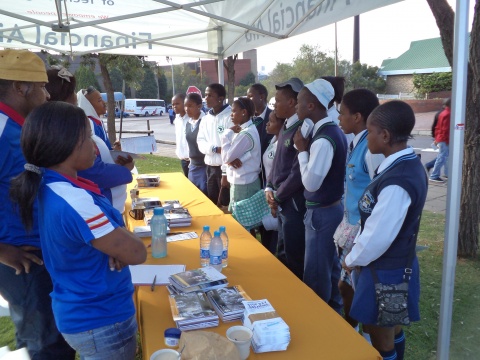
On Saturday the 12th of May, 25 Grade 12 learners were at the IkamvaYouth Ebony Park centre by 6:30am ready to attend the much awaited University Open Days. The Universities that had Open Days included Wits University, University of Johannesburg and Tshwane University of Technology. The learners arrived at the different Universities by 7:30 am and began to tour the University grounds and also began to interact with other learners from the universities as well as other High Schools. They toured around the different faculties and with the assistance of our very commited volunteers, the learners began to make some serious decisions about what they wanted to study in tertiary and see what they already qualified for with their current marks.

The Ikamvanites enjoyed the whole experience and said that it gave them a chance to interact with people from all over the country and also get a perspective of what university life is like from the university students. Dikamatso, an Ikamvanite from Tsosolotso High School said that it was a great motivator to see what they saw and experience all they experienced. The end result of the day was that the Ikamvanites decided to continue to take their future into their own hands by collecting the application forms and bursary applications. The Matriculants all understand that by failing to prepare they are already preparing themselves to fail, therefore preparation is very essential.
We look forward to succcessful Grade 12’s this year and the IY team would like to continue to thank the loyal volunteers who have committed themselves to helping all our learners.
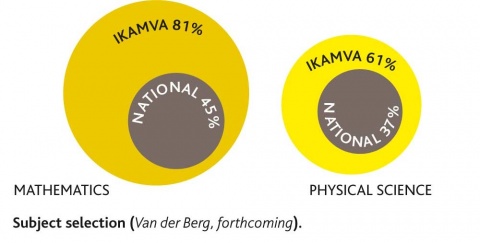
IkamvaYouth is pleased and proud to announce the publication of Against the odds: An evaluation of the IkamvaYouth programme, by a team of economists at the University of Stellenbosch. Servaas van der Berg and his team conducted an in-depth evaluation of IkamvaYouth, by administering questionnaires and interviewing 828 ikamvanites (past and present).
The full report is available here for download, and contains a wealth of information, results, analysis, quotes from ikamvanites and recommendations for improvements and scale.
Some of the findings have validated the results we’ve reported via our own tracking (see below). However, there were also some new and interesting findings, including:
- Insight into ikamvanites’ wealth and living standards
- Only 38% of ikamvanites live with their parents; 45% sometimes go to bed hungry; only 31% have their own desk or table at home and 65% have their own bed.
- 22% of mothers have matric and 11% have some post schooling
- 15% of fathers have matric and 9% have some post schooling; 32% of fathers’ education levels are unknown
- Matric results as compared with those of our feeder schools
- Detail regarding learners’ choosing Maths and Science and their performance in these most-challenging subjects
- “An overwhelming majority (81%) of Ikamva students in 2011 elected to do Mathematics, versus less than half of all candidates nationally. For Physical Science too, far more Ikamvanites chose this difficult option. Reponses to the survey indicate that similarly high proportion of former Ikamva students had elected these two subjects: 78% wrote Mathematics and 54% Physical Science.”
- “The difficulty of these subjects can be gauged from the fact that nationally, the pass rate (at 30%) is 46% and 53% for these two subjects respectively, much lower than for other electives such as Geography (70%) or History (76%), despite the fact that the candidates in these first two subjects are a far more select group in terms of academic ability. This ambitious subject choice is even more exceptional when compared to learners from similar (mainly township) schools. Ikamva’s encouragement of learners to take these more difficult subjects necessarily affects the relative pass rates and the subject performance of Ikamva learners negatively, thus the need to carefully consider this when evaluating Ikamva learners’ results.”
- “61% of all Ikamva matric candidates wrote and passed Mathematics, as against only 21% for all South African matric candidates.3 The proportion of all Ikamva matric candidates who achieved 40% or more was 28% versus 14% for all South African candidates. Compared to similar communities the Ikamva performance in this regard would even be more impressive than this.”
- ” What Ikamva thus successfully manages to do is to encourage learners from across the ability spectrum to raise the bar, by entering for subjects which the typical student from weak schools would usually avoid, and then to achieve success which is at least comparable to that achieved by candidates that often are more selected in terms of ability and from higher socio-economic groups. This is a truly impressive achievement.”
- The good results are consistent: “average results differ little between branches”
- The programme is very highly regarded by our learners and ex-learners (they do tell us these things, but it means a great deal more when told to independent evaluators)
- “The evaluation team is confident that Ikamva’s short term impact is considerable. This lies not only in the improved matric performance, but even before that in helping to create an environment where children from often very disadvantaged circumstances feel a sense of belonging and that someone cares about their needs and ambitions. That alone is a very valuable contribution. The extent of this contribution cannot be measured, but is visible in the fact that Ikamva was so highly praised by all who participates in it, or have done so in the past. As an evaluation team we have not seen such universally high praise of an organisation before.”
- Insight into the “success factors” behind the IY model
- “The remarkably successful personal relationships that Ikamva has developed with participants, based on extremely sensitive interaction with learners, yet without undermining basic discipline: “Kickouts” still occur and learners know that they can only remain part of the “family” if they play their part.”
- The tutors: “They are largely volunteers and mostly young. The fact that many of them are former Ikamvanites say something about the glue that holds Ikamva together: A positive social context in an environment where many face harsh circumstances at home, in the labour market, schools, universities, and wider society. The link with Ikamva means much to them, and also provides some continuity in their lives. Also, they act as role models to learners, thus further strengthening the desire of learners to undertake tertiary studies. Their relative youth also means that communication with learners is easier, in contrast to what learners experience at school. The team found no evidence that the tutors were particularly well trained or that they were always much better teachers than those in schools; the commitment, positive interaction and additional time were apparently most important in the success of students, not the better teaching.”
- “The fact that Ikamva operates in metropolitan environments where there are universities close by is an important factor in its success. Without a strong volunteer base, the tutors would not have been available, and it would have been more difficult to build the passion for tertiary studies that drives many Ikamvanites.”
- “The most important factors in Ikamva’s success, however, appear to be its commendable organisation, good planning and the enthusiasm of those at the head of the organisation. This enthusiasm is contagious.”
- Matric results
- “85% of Ikamva candidates passed, against the 70% nationally, or put differently, that Ikamva’s failure rate of 15% was half of the national average. But the full extent of Ikamva’s performance success is not yet captured in simple pass or fail rates: What is quite impressive is Ikamva’s performance in terms of getting learners access to universities: 36% of Ikamva candidates, versus 24% nationally, obtained a so-called “Bachelor’s degree endorsement”, i.e. a pass that is considered by the Department of Basic Education as good enough for degree studies. This is what used to be referred to in the past as “university exemption”. Data on a race basis is not yet available for 2011, but to put the Ikamva performance in terms of potential university entry in perspective, it is worth considering that the proportion of black students who obtained such exemptions in 2007, the last year for which race data could be obtained, was only around 11%. Altogether 72% of Ikamva candidates passed with either Bachelor’s or a Diploma endorsement, i.e. could potentially attend a university for degree or diploma studies (some universities have stricter entry criteria, though), whilst this proportion is only 53% amongst matric candidates nationally.”
- Placement into post-school opportunities
- More than half of respondents who had matriculated whilst participating in Ikamva after matriculating (58% of the 119 such respondents in the survey) indicated that they had gone onto university studies, and another 14% that they had continued onto “college” (here interpreted fairly broadly as other post-school studies). This thus left only 28% who had not gone on to further studies.
Key recommendations which we’re currently considering carefully include:
- Find ways to support learners as they adjust to life at tertiary
- “Ikamva could, and should, find ways of assisting students to make the transition to university, both by assistance with the initial exposure to academic English that many respondents to the qualitative interviews found daunting, and by helping them to find support structures to reduce the anomy that they experience when starting at university. Ikamva would have to decide how much of this it wants to engage in itself (which is not its core activity), and how much can be done by assisting Ikamvanites to link to other institutions (e.g. NGOs and university structures) that could assist.”
- Provide more support to build proficiency in Academic English
- Scale cautiously:
-
“Given how important Ikamva’s leadership is in its success, one may well argue that it would be extremely difficult to scale up the activities, particularly across many more centres. The evaluation team has indeed expressed its reservations about that in previous interaction with Ikamva: It is easy for leadership to under-estimate the importance of its own role. A dilution of this leadership across a much bigger organisation may lead to the programme losing some its attractiveness to students. On the other hand, analysis shows little difference in performance between branches. This could be interpreted as that the success lies in the model, and not in the particular leadership at branch level. This would be consistent with a view that expansion could be attempted as long as good branch leadership can be found. A cautious approach may be to consider expansion only when there are good support structures and where good branch managers are available, but not to be over-ambitious. The strong central leadership capacity that Ikamva possesses for planning and organisation is an asset that could be built on and that may offer a solid foundation for expansion, but it should not be endangered by too rapid expansion. Also, expansion should retain the essentials of the existing model, which importantly includes proximity to a university environment, preferably in a metropolitan area. This limits scalability, but such a conservative stance may be appropriate.”
IkamvaYouth is greatly appreciative to the Evaluation team (Nic Spaull, Ronelle Burger, Cobus Burger, Chris van Wyk, Servaas van der Berg, Robert Dzivakwi and the fieldworkers), ikamvanite Phillip Mcelu for tracking down 95% of all ikamvanites (!), DGMT for making this possible, and to all the ikamvanites who participated in the survey and interviews.

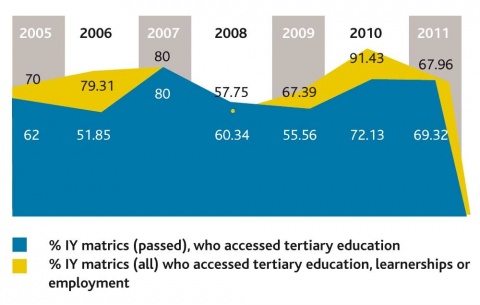
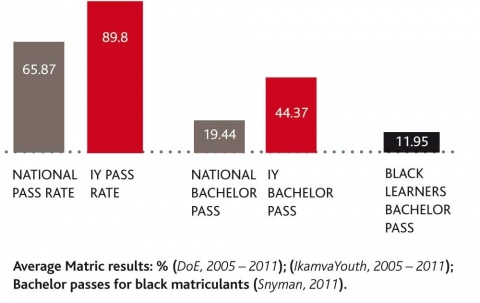
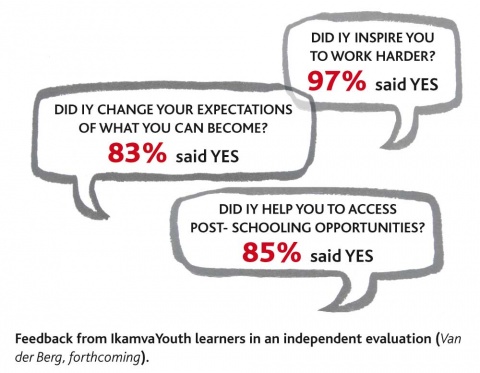
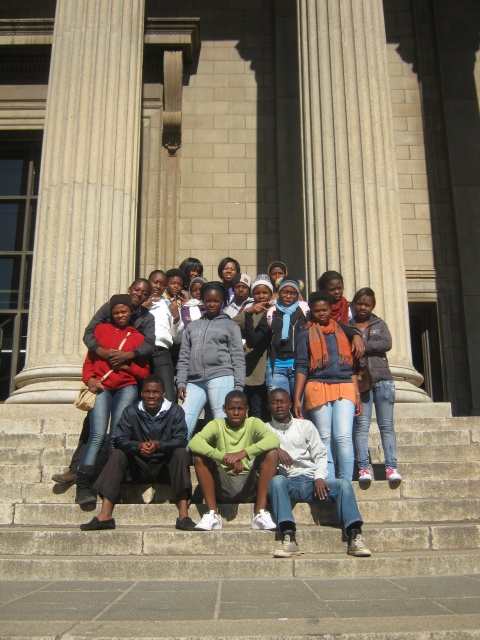
Learners from the class of 2011 have begun their journeys to ‘really bright futures’ and are paying-it-forward

Ivory Park outing to University of Wits 2011 – inspiring the leaders of tomorrow
I think I have a really bright future, thanks to everyone that has supported me… and myself!” Zintle Mtakati (Class of 2011, Masiphumelele Branch)
IkamvaYouth reported an 85% matric pass for its class of 2011 in January, but the organisation ultimately measures its impact in the number of learners who access post-school opportunities. 69% of IkamvaYouth’s matriculants have enrolled in tertiary education (including top institutions such as Wits, UFS and UCT), and overall, 97% of those who wrote the matric exams have accessed tertiary institutions, learnerships, employment, or are being supported to rewrite in 2012. 58% have transformed from beneficiaries into benefactors by becoming volunteer tutors and mentors for the next generations of learners.
The 2010 General Household Survey found that only 4,2% of South Africans aged 18 to 29 were enrolled at higher education institutions. Whereas 17,4% of white youth were enrolled at university, this was true for only 3,1% of black Africans and 3,5% of coloured persons (STATS SA, 2011). “The nation’s obsession with matric results is misplaced”, says IkamvaYouth director Joy Olivier. “It is only through access to post-school opportunities that the challenges of unemployment, poverty and inequality can begin to be addressed”. National coordinator Zamo Shongwe points out that “unfortunately, with the system struggling to deliver on the basics of literacy and numeracy, and most parents without the information or resources to assist their children, many young people are left stranded at this pivotal point in their lives”.
IkamvaYouth supports learners as they learn about, apply to, secure financial aid for, and enrol in universities, universities of technology, learnerships, internships and jobs. Every year since 2005 ikamvanites have achieved miraculous results, and once again, the low-cost / high-impact model’s effectiveness has been proven. Between 2005 and 2011, 66% of the programme’s 403 matriculants have enrolled in tertiary institutions. Overall, the peer-to-peer academic and social support system has ensured that 77% of matriculants since 2005 have enrolled in education, a learnership or a job 2.5 months following matriculation.
One ikamvanite who has been in the programme since 2009 has had to navigate a multitude of obstacles throughout her life including a lack of information, transport restrictions, and financial constraints. Her mother is HIV positive, works as a domestic worker and has brought her daughter up on her own. Now, she is studying for a BA in Human and Societal Dynamics at the University of the Free State on a full academic bursary, awarded by Jonathan Jansen.
The hard-working branch staff, volunteer tutors and mentors inspire and equip their learners to dramatically change the course of their lives. Two branches (Masiphumelele and Nyanga) had grade 12s for the first time, and their results are further evidence of the replicability of the model. The branches’ 2011 placement results are:
|
|
% matriculants accessing tertiary
|
% matrics overall who are writing supps/rewriting or accessing tertiary, learnerships, employment or rewriting
|
|
Makhaza
|
82%
|
100%
|
|
Nyanga
|
71%
|
100%
|
|
Masiphumelele
|
41%
|
100%
|
|
Chesterville
|
78%
|
95%
|
|
Ebony Park
|
82%
|
87%
|
Anathi Malindi, a Grade 12 from the Nyanga Branch, achieved a Bachelor pass in her exams and is now studying Analytical Chemistry at CPUT. Her mother was “so relieved and happy that her future is brighter now”. The majority of ikamvanites come from homes where one basic income supports an entire family, where unemployment, alcoholism and domestic violence are the norm, and access to university has hitherto been an idealised pipe dream. For ikamvanites it is becoming a reality. 83% of Ikamvanites surveyed in 2011 stated that IkamvaYouth had changed their expectations of what they could become. The fostering of self-belief and the support offered to learners truly allows them to proclaim that “today my life begins” (Anathi Malindi).
Placing learners at the centre of programme design and delivery ensures a lasting impact. Vuyiseka Melani, from the Nyanga branch, says “it’s not just the tutoring that makes us attend Ikamva, but the support and the love we receive from all the tutors”. IkamvaYouth works with learners in grades 8 to 12 to ensure that they do not become part of the growing cohort of unemployed and uneducated youth. As each matriculating year exceeds their own and others’ expectations, more are inspired to become volunteer tutors themselves. The organisation’s consistently impressive track record has attracted new supporters, staff and volunteers, enabling the organisation to establish two new branches (Ivory Park in Gauteng and Umlazi in KZN) and enroll 711 learners across the country in 2012.
The ikamvanites are inspirational examples of young people becoming agents of their own change and the architects of their own futures. The organisation is calling out to anyone and everyone to join and enable further success breeding success. Join us and lift as you rise!

Over 320 abstracts were submitted to the SA Basic Education Conference from teachers, principals, academics, government, non-government organisations, and the corporate sector, and IkamvaYouth’s submission has been selected as a poster presentation on 2 April. Zamo Shongwe and Joy Olivier will be representing the ikamvanites at this event, and are looking forward to learning, sharing and connecting with the conference delegates from all sectors. Professor Metcalfe, the conference chair, said that “it is very encouraging to see the creative and innovative ideas coming from teachers and principals at the coal-face of basic education”, and we’re looking forward to being a part of it.
IkamvaYouth’s poster presentation will be uploaded here in the coming days, together with background information, references and acknowledgements. We hope that readers will engage with it and send us your comments and questions via the facebook comment functionality below.


The DG Murray Trust has made a significant investment in IkamvaYouth, towards core operational costs and to enable an independent evaluation of our impact, which Dr Servaas van den Berg is currently conducting.
The Trust has also recently published a learning brief from IkamvaYouth. Read the full report here to learn more about our organisation, how we began, how we operate, the impact we’ve achieved to date and the lessons we’ve learned along the way.
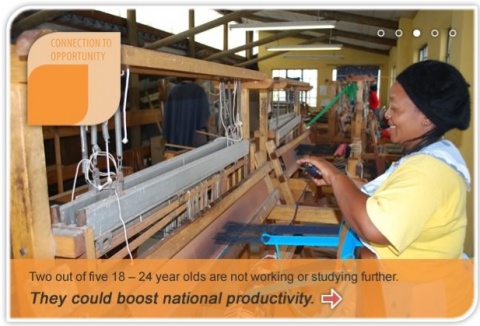

Makhaza branch had an opportunity to pilot a project with Education with Borders (EwB) who aims to provide improved educational opportunities and facilities in disadvantaged regions of the world. EwB focussed on our Grade 8s as the program helps lower grade learners understand basic maths principles.
The Education without Boarders (EwB) program highlights the simplicity of mathematics and emphasises the critical importance of foundational skills while acknowledging the complicated challenges and circumstances of life, which many of IkamvaYouth learners are coping with. This is has been fantastic program that promises to make a profound difference not only in learners’ maths results but also in other areas such as boosting their confidence in their existing abilities. This allows learners to approach new learning experiences with a much more confident focus on learning. And that makes them much easier to tutor.
The two dedicated tutors who gave all their tutoring time to the EwB programme, Nicholas Mei and Braam Daniels say from their experience that while they are essentially tutoring maths they noticed a huge improvement in the confidence and attitude of the learners toward their school work. The environment and culture of IkamvaYouth and the EWB programme creates a holistic approach which rather than just “teaching” learners it enables them to become aware of their inner ability to teach and learn for themselves. So while the focus has been on maths, the deeper things the learners have learned have manifested in all academic areas as it provides these learners with everything they need.
To determine the impact of the program, the class average of maths results achieved by the learners during the year was compared to the average maths result achieved by the entire grade of the two dominant local schools (i.e. Chris Hani High and Harry Gwala High). The comparison is shown below in Figure 1.
Figure 1
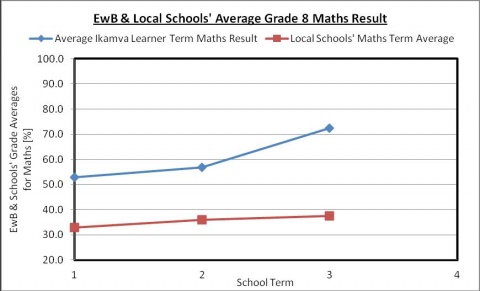
Figure 1: Comparison of the average EWB Grade 8 learner result to the local schools’ average grade result.
Figure 1 shows that not only did the EwB program learners consistently outperform their local schools but they also showed a greater overall improvement in their maths mark when comparing the 1st and 3rd term results. The EWB class’s school maths average improved by 19.6% while the local school only showed a 4.75% improvement.
The EwB programme has played a huge role in helping learners improve academically, not only in mathematics, but it has also trained the learners to be able to approach any kind of question without them struggling. It has helped them gain confidence in approaching maths questions and most of all it has taught them on how to work as a group.
So while sharpening basic math foundation skills with the EwB content and challenging the learners as cooperative groups with basic algebra problems, in a consequence-free learning. The program has already begun to be implemented with the next group of grade 8s in 2012, as well as implementing an English language component and looking to expand to other branched.
Well done to our learners for these amazing results and to EwB
ewb_program_report_iymakhaza_dec2011.pdfewb_program_report_iymakhaza_dec2011.pdf
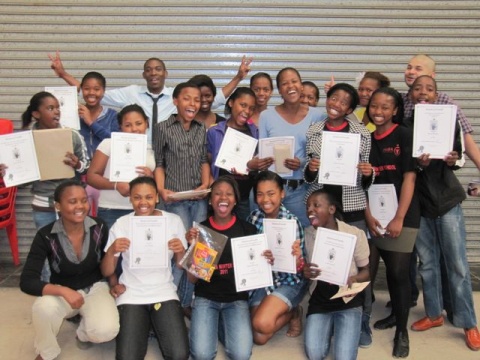
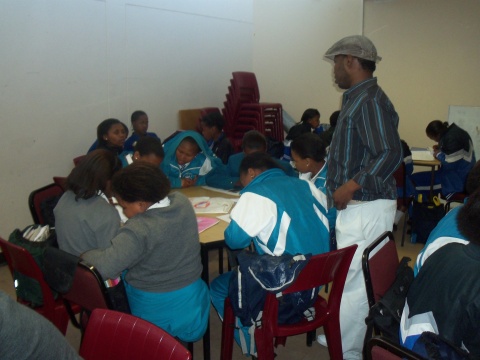
















 Lloyd Lungu
Lloyd Lungu